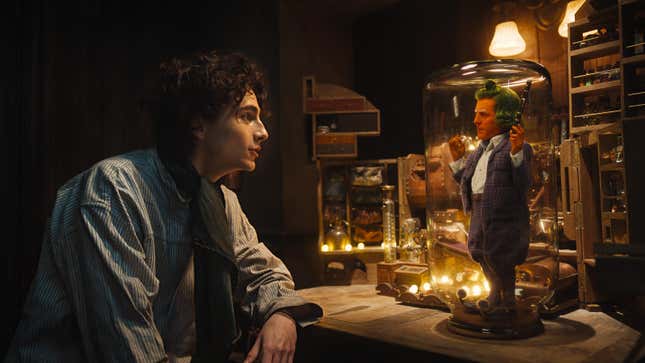
The point of co-writer/director Paul King’s musically oriented origin story Wonka isn’t to answer the question of how a budding candy maker became the mercurial, withdrawn weirdo we met in the pages of Roald Dahl’s book Charlie And The Chocolate Factory and on screen in both 1971’s Willy Wonka & The Chocolate Factory Charlie And The Chocolate Factory. Rather, it’s to tell a character-enriching backstory capturing a time when Willy Wonka’s initial big dreams changed the world for the better. That’s a smart path considering the former narrative track, seeing a beloved Willy Wonka morph into a world-weary, workaholic recluse, would be a flat-out bummer.
- Off
- English
In King and company’s capable hands, the care package delivered is a soul-warming cup of cocoa. Sweet yet never saccharine, cute yet never cloying, their hyper-stylized portrait of an iconic literary and cinematic figure is not only powered by the pure imagination that inspires the songs’ spectacle, but it’s also filled with audacious flourishes of charm, whimsy and poignancy. The filmmakers’ lofty aims yield much reward as the picture’s heart-filled and, at times, radical sentiments feel genuine.
Wannabe chocolatier Willy Wonka (Timothée Chalamet) hasMary Poppins-esque hat full of innovative ideas and other career-improving accoutrements. Shortly thereafter, he becomes destitute, seeking warm shelter at a local laundry run by Mrs. Scrubbit (Olivia Colman) and Bleacher (Tom Davis), two Les Misérables-esque grifters who con unwitting targets into legally binding, grueling labor contracts. Making his mark in town proves difficult when Wonka’s shifty competitors—Slugworth (Paterson Joseph), Prodnose (Matt Lucas) and Fickelgruber (Mathew Baynton)—try to run him out of business. They’re a part of an underground, underhanded chocolate cartel syphoning off chocolate and storing it to bribe officials.
Now a prisoner of misfortune stuck in a workhouse basement with accountant Abacus (Jim Carter), cringe-comedian Larry (Rich Fulcher), plumber Piper (Natasha Rothwell), phone operator Lottie (Rakhee Thakrar) and orphan Noodle (Calah Lane), Willy’s spirits are low. He’s also indebted to a rather pestery orange Oompa Loompa (Hugh Grant), whose stolen cocoa beans led to the little bespoke-suited man’s exile. But all hope isn’t lost. With the gang’s combined efforts, Willy is able to skirt corrupt authorities, like the Chief of Police (Keegan-Michael Key) and Father Julius (Rowan Atkinson), and continue his business on the sly. However, the nefarious cartel’s reign has a stranglehold over the city and Willy’s dreams are in danger of being permanently dashed.
King and co-writer Simon Farnaby, who also cameos as a lovelorn zoo security guard, subtly pad the picture with fairly rebellious (at least for family fare) anti-slave labor and anti-establishment ideals. Its anti-corporate messaging is delivered with a tinge of irony given that it’s released by a studio conglomerate. Themes surrounding community betterment and enhancement from the eyes of an immigrant feel like a familiar extension of their Paddington films without being reductive or derivative. Everything refurbished is given a new glean, from overt nods to the ’71 adaptation, threading in phrases and songs, to more covert callbacks in character construction (specifically the Chief’s gluttony manifesting in a growing waistline much like Augustus Gloop and Violet Beauregarde).
Chung-hoon Chung’s cinematography is scrumdiddlyumptious, coming alive in musical numbers like the bombastic Broadway-bound “You’ve Never Had Chocolate Like This,” the transportive “A World of Our Own” and the colorful “Sweet Tooth.” Though perhaps not as instantaneously catchy as the original’s tunes, Neil Hannon’s compositions are connective, propelling character drive to the fore—Chalamet and Lane’s waltz-y duet “For A Moment” being a prime example. Nathan Crowley’s production design is sprawling and spellbinding, enhanced by VFX magicians augmenting its immersive qualities. Lindy Hemming’s costume designs are tangibly textured with evocative detailing, like the Chief’s uniform mimicking Violet’s blue belted suit and Wonka’s worn-down chocolate colored hat and velvety violet coat recalling Wilder’s Wonka garb.
That said, there is a slightly bitter aftertaste. Wonka’s supporters, outside of Noodle, are undercooked. There’s a passing mention of how they were all conned, but not how each of them found themselves in the hovel. We’re to assume Larry’s divorce and Abacus’ unemployment caused monetary hardship, but there are no dots to connect with Piper and Lottie. Wonka himself is characterized as a rube, his illiteracy notwithstanding, blind to obvious dangers—like getting smacked in the face with a frying pan or battered by a constable’s club. There’s not even a hint that Wonka is, or is at least becoming, the smartest, savviest and most sarcastic wit in the room.
When any narrative stress fractures occur, Chalamet makes up for them with his ebullient charisma and undeniable charm. His magical emcee isn’t too far off from Gene Wilder’s as glimpsed in his physicality and vocal intonations, but his performance has its own unique sway and ease. The foppish mop Grant once sported in the ’90s, now resting on Chalamet’s head, feels a little like a passing of the torch, even though this isn’t a rom-com, but a romanticized portrayal nonetheless. Between his droll delivery and hilariously acerbic attitude, Grant makes a full meal out of his sparse screen time, singing, dancing and goofing on the titular character.
Still, the film’s wholesome sensibilities go down smoothly, satisfying our discriminating palates. It’s an amuse bouche to a nostalgic meal Dahl and Wilder once crafted. And while King and Chalamet don’t necessarily break that mold, their collaboration leaves a lovely imprint.
Wonka opens in theaters nationwide on December 15
